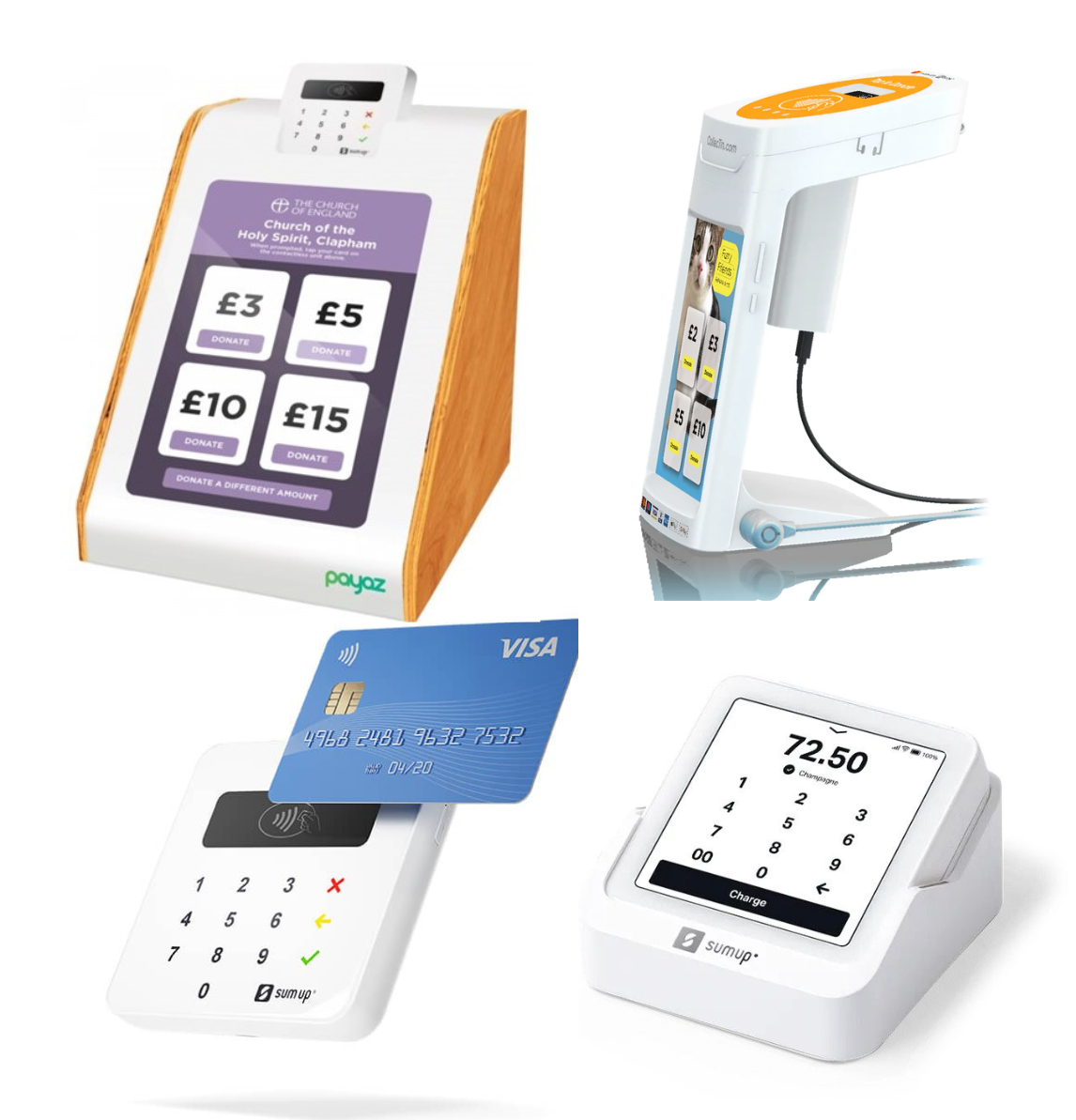Click on the links below for more information about the different ways to give.
Contactless Giving |
Legacy Giving |
Online Giving |
Parish Giving Scheme |
To help encourage people to give we need to provide the right mechanisms. The more options we can offer and the easier it is for people to give, the more success there will be.
When considering how to improve your giving mechanisms look closely at what your church is currently doing and think about the following:
- How do you invite visitors to give financially to your church?
- Imagine you are new to your church, how easy is it to start giving regularly?
- Who do people need to speak to?
- Is it clear on your church website or AChurchNearYou page?
- Consider how you normally give to charity outside of church. Is it different and if so, are there ideas that you could think about introducing to your church?
- Does your church use technology like contactless devices or an online giving platform?
For more information or to discuss your parish's individual needs please contact the Diocesan Giving Adviser, Lindsay Yates.
Contactless Giving
Contactless giving enables people to give to your church quickly and easily by debit or credit card.
easily by debit or credit card.
People carry far less cash than they used to and more and more payments are now made by contactless or card payment. It is important that our churches enable people to give by contactless giving too.
Contactless giving is not a substitute for regular planned giving (such as via the Parish Giving Scheme), but it offers visitors to your church an opportunity to give and offers your church the ability to accept fees for baptisms, weddings and other occasional offices by card.
Consider whether you want a basic contactless device (such as a Sum Up air or Sum Up solo) for collecting fees or whether you want something with more of a presence to help to encourage generous giving (such as a Payaz or CollecTin). You can find details of different contactless devices available at a discount and with preferential transaction rates on the Parish Buying Website
Contactless Devices Testimonials
Both St Mildred’s, Canterbury and St Michael’s, Sittingbourne received CollecTin More devices as part of the Canterbury Diocese Rollout in May 2024. Both churches have seen an increase in donations since getting a device.
Despite being in central Canterbury, St Mildred’s suffered with some real connectivity issues and needed to get a router to boast its 4G signal so that the device could be used reliably.
Talking about the device, Tessa Taylor, Lay Reader, said “We did have a problem in the beginning because there was an issue with connectivity and then a problem with our router, but Lindsay and Vicky from the Generous Giving Team bowled up and sorted it out.”
"One of the younger members of the congregation walked in on the first day when the contactless payment device was up and running. He said “that machine will save this church!" and he wasn’t wrong! I can hugely recommend it to other churches.”
The Revd David Ridley, Vicar of St Michael’s, Sittingbourne, explained that for them the CollecTin really comes into its own at the outreach events they run.
He said “I would recommend the CollecTin to other churches because it is portable. As a result, we have found we can use it flexibly at all sorts of outreach events such as our weekly Warm Welcome and annual Christmas Tree Festival.”
Online Giving
 |
 |
 |
Online giving enables people to give to your church through your church website or social media page, making it easy for people to give. Recommended platforms for churches are Give A Little, and either Stripe or Sum-Up. Details of how to get started are available via Parish Buying. It is also now possible to use the Parish Giving Scheme to faciliatate online giving by directing donors to your PGS landing page where they will be invited to make either a one-off or regular gift.
QR codes can be generated to take donors to your online giving page. For more information about how to do this using Give A Little please see The Church of England Website.
To use the Parish Giving Scheme for giving via QR code please visit your church's landing page and scroll down to 'Download the QR code for this parish'.
For an example of an effective and successful online giving campaign please see All Saints Church – Eastchurch. Their homepage contains a 'Donate' button which takes donors straight to the church's Give A Little page. QR codes are used on weekly service sheets and on a poster on the church noticeboard to take donors to the same page where they can make a single or monthly gift.
Please contact generousgiving@diocant.org for further support.
Legacies

Generosity is at the core of Christian discipleship and this extends past the end of our lives. Gifts in wills are a valuable source of income for churches with most unrestricted gifts forming the backbone of church reserves.
Leaving a gift in your will to your church will helps to serve the needs of your church community long into the future. Our churches depend on the generosity of these gifts (whether large or small) to carry out much needed refurbishments, launch outreach projects and to grow their mission and ministry.
Faith Will 
The Church of England is partnering with Christian Aid as part of its Faith Will Campaign which focusses on the good that we can achieve by leaving a gift to both Christian Aid and our local church in our will. Christian Aid has produced a range of resources to help churches talk about wills and legacies with their congregations and can also provide a speaker for any events churches put on promoting legacies.
The Church of England receives less through legacies than many other charities and it is important to remind people of the good that can be achieved by leaving a legacy to fund crucial humanitarian work carried out across the world by Christian Aid, as well as to local churches which have unique opportunities to transform their local communities in Christ's name. People on average leave around three gifts to charities in their wills and churches that have already run the campaign found it easier to ask people to remember their church when they were also asking for another charity.
For more about the Faith Will Campaign see the Christian Aid website and contact generousgiving@diocant.org.
You can also watch a recording of our Canterbury Diocese webinar led by the Faith Will team from Christian Aid below.
What should the PCC do about Legacies?
It is important that your PCC has a policy about legacy giving that you share with your congregation so that they will know what will happen to their gift. For help and advice creating your legacy policy contact the Generous Giving Team. Please find a Legacy policy template here.
You should also consider how you can promote will-making and legacy giving in your parish and you may wish to consider running a legacy campaign. To begin to plan this you can order your free PCC toolkit.
Resources & Information
The Church Legacy website is full of essential information on encouraging people to make wills, and legacy giving.
Parish Giving Scheme
Created by the Church for the Church. A non-profit organisation facilitating regular giving in every church.
The Parish Giving Scheme is an excellent way to encourage greater generosity within your church. PGS offers significant benefits compared to other forms of giving:
- It's free and your church receives the full value of all donations every month
- Gift Aid is automatically processed every month, reducing admin for church volunteers and improving cash flow
- Givers can choose to automatically increase their giving by the rate of inflation every year. This tackles the problem of 'static giving', where people’s giving ordinarily remains the same year on year, while the costs of the church rise continually, due to inflation
- Givers can sign up by paper form, over the telephone or online, making it a great resource for both rural and urban parishes
- Adopting a new scheme offers a great opportunity to discuss regular giving with the church community
- Givers can make one-off payments by credit/debit cards and Apple/Google pay.
If you're an existing donor wanting to make changes to your direct debit, you can do this on your online account, over the phone via 0333 002 1260 or by email at info@parishgiving.org.uk.
The scheme is a registered charity and is used by most dioceses in the Church of England.
Promoting One-off Giving via PGS
PGS provides an easy way to enable one-off giving in your church, allowing visitors to make a gift and regular donors to top-up their existing giving. Each church that has joined PGS has its own unique QR code. To access the code please visit your church's landing page and scroll down to 'Download the QR code for this parish'. The code can be added to noticeboards, posters, leaflets and pew-cards like the one below.
Pew card example page 2 (with QR code)
In 2024 over £76,000 was raised through 479 one-off donations made via PGS, so it is well worth promoting this way to give to your church.
For help with accessing your church's QR code and creating fundraising material please contact generousgiving@diocant.org.
Registering your Church for PGS
It is free for your parish to register with PGS - if you would like to do so, please fill in the relevant form below. Below you'll also find a step-by-step guide for registering your church and a special guide for PCCs - please make sure that you've read both of these documents before filling out your registration form. Once you have completed your form please send it to generousgiving@diocant.org
- PGS: A Guide for PCCs
- How to Register your Church for the Parish Giving Scheme: A step-by-step guide
- PGS Single Church Registration Form (please set your printer to use A4 paper and scale to fit)
- PGS Multi-Church Registration Form (please set your printer to use A4 paper and scale to fit)
- How to launch PGS for the first time
- Introduction to the Parish Giving Scheme
- Latest PGS Gift Form (November 2025)
Once your parish is registered with the scheme, it is quick and easy for people to give. Further information for givers can be found in Your Guide to Giving.
If you are interested in setting up the scheme in your church and would like to find out more, please contact the Generous Giving Officer, Vicky Alford